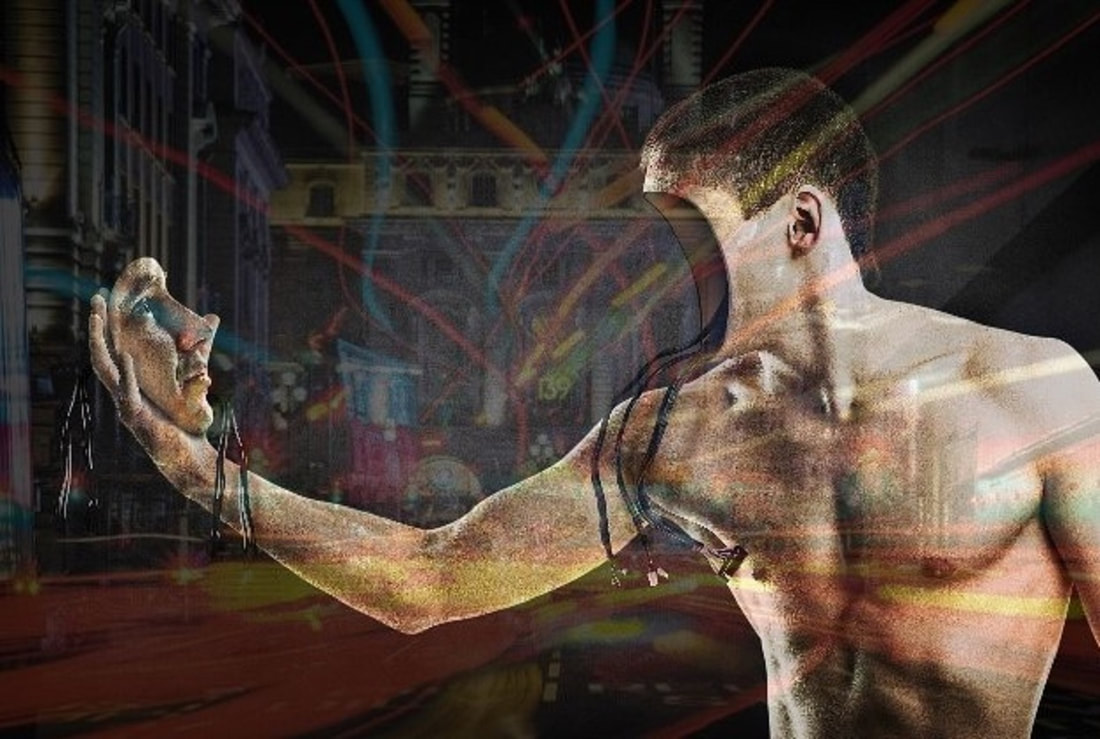The Many Ways Modern Life And Technology Can Disconnect Us
OK, first of all this piece is in no way an attack on modern technology or a desire to go back to the often rose tinted “good old days!” Make no bones about it, modern life and all the gadgets and devices that go along with it should be celebrated, embraced and utilized.
Like everything else, though, modern life is a question of balance – in this case between the exciting “new” and the tried and tested “old.” With every new technology unleashed on the populace to make our lives easier, it is perhaps inevitable that something else gets lost or neglected. Whether it is being disconnected from each other, traditions of the past, or even from ourselves, modern technology has at least a few pitfalls that maybe we should be mindful of.
Like everything else, though, modern life is a question of balance – in this case between the exciting “new” and the tried and tested “old.” With every new technology unleashed on the populace to make our lives easier, it is perhaps inevitable that something else gets lost or neglected. Whether it is being disconnected from each other, traditions of the past, or even from ourselves, modern technology has at least a few pitfalls that maybe we should be mindful of.
Media Saturation
There is no doubt that having a huge choice of television channels is a good thing, as are the variety of ways we can now consume our entertainment. Whether it is on a games console, a personal computer, a handheld device, or just “old school” on the tube, it is possible to be entertained or informed twenty-four hours a day, seven days a week, almost regardless of where you are.
There is, however, an argument to be made regarding the over-saturation of media. Although there is more on offer, the quality doesn’t always reflect the vast amount of choice. Whether it is repeats, shopping channels, and even casino and gambling channels, a lot of what is available will appeal to one small group of people or another only.
Perhaps there is also the loss of the “prime time Saturday night community” – OK, so I made that group title up, but bear with me a moment. At one time, when the choice of channels was in the single numbers, you could sit safely in front of the box, knowing that the vast majority of people were watching the exact same thing as you. Plenty of fodder for the water fountain chats, and a bizarre sense of connection with others from the comfort of one’s living room.
In this climate, new programs can also sometimes struggle to get off the ground. New shows and ideas often do not get high viewing figures when they are first run, and sometimes are binned before they have been given a chance to find their audience. How many “classics” might we have missed out on because of this?
There is, however, an argument to be made regarding the over-saturation of media. Although there is more on offer, the quality doesn’t always reflect the vast amount of choice. Whether it is repeats, shopping channels, and even casino and gambling channels, a lot of what is available will appeal to one small group of people or another only.
Perhaps there is also the loss of the “prime time Saturday night community” – OK, so I made that group title up, but bear with me a moment. At one time, when the choice of channels was in the single numbers, you could sit safely in front of the box, knowing that the vast majority of people were watching the exact same thing as you. Plenty of fodder for the water fountain chats, and a bizarre sense of connection with others from the comfort of one’s living room.
In this climate, new programs can also sometimes struggle to get off the ground. New shows and ideas often do not get high viewing figures when they are first run, and sometimes are binned before they have been given a chance to find their audience. How many “classics” might we have missed out on because of this?
Internet Shopping
For some, internet shopping is not just a luxury, it is a lifesaver. For those who may be housebound due to illness or age, the option of being able to do a weekly shop from a computer screen and have it delivered right to their door is no doubt a huge positive to their quality of life.
For most of us, though, we shop more online simply because it is easier – and that is understandable too. However there remain advantages to actually physically going to the shops and buying our food or any number of items in person.
Aside from the obvious benefits of keeping the “high street” active (lest shops morph into warehouse pick-up points), there is also the possibility of discovering in-store only bargains. Then there is good old fashioned customer service. As much information and reviews as there usually is on products online, having someone in front of you who you can ask questions to, or even go back to if there is a problem with a product, makes life less stressful in the long run.
Perhaps much more importantly is the simple fact that it keeps contact and interaction between people physical and face-to-face.
For most of us, though, we shop more online simply because it is easier – and that is understandable too. However there remain advantages to actually physically going to the shops and buying our food or any number of items in person.
Aside from the obvious benefits of keeping the “high street” active (lest shops morph into warehouse pick-up points), there is also the possibility of discovering in-store only bargains. Then there is good old fashioned customer service. As much information and reviews as there usually is on products online, having someone in front of you who you can ask questions to, or even go back to if there is a problem with a product, makes life less stressful in the long run.
Perhaps much more importantly is the simple fact that it keeps contact and interaction between people physical and face-to-face.
Movie Nights and Video Rental
Back in the days of the video store, where the latest blockbusters could be yours for the night for a small fee, many of us would make an evening of it, with friends or family all crowded around the television to view the latest must-see film. If you weren’t there on that particular night, you missed it – the movie was back in the shop the next day.
Now, with access to thousands of films on numerous different services, the option for family and friends to get together is still there, but the fact you don’t “have” to make it a certain night perhaps makes it a little less important – even less appealing.
Back in the days of the video store, even the trip down to the shop was part of the evening. Whether it was deciding exactly what film you were going to rent for the night, or stocking up on plenty of popcorn, snacks and drinks, the evening was always more than just watching a movie.
Of course you might argue that the video store and the opportunity it brought were eventually victims of their own success. The service for people being able to have the latest classic on their own television on the exact night they wanted it, instead of having to go to the cinema or wait for it to be shown on one of the network channels, were the first steps to its very own demise. Progress has now gotten to the point where we have these things in our homes, instantly and at a touch of a button.
Now, with access to thousands of films on numerous different services, the option for family and friends to get together is still there, but the fact you don’t “have” to make it a certain night perhaps makes it a little less important – even less appealing.
Back in the days of the video store, even the trip down to the shop was part of the evening. Whether it was deciding exactly what film you were going to rent for the night, or stocking up on plenty of popcorn, snacks and drinks, the evening was always more than just watching a movie.
Of course you might argue that the video store and the opportunity it brought were eventually victims of their own success. The service for people being able to have the latest classic on their own television on the exact night they wanted it, instead of having to go to the cinema or wait for it to be shown on one of the network channels, were the first steps to its very own demise. Progress has now gotten to the point where we have these things in our homes, instantly and at a touch of a button.
Music - Just Take What You Want
In the days before MP3s or iTunes, even before compact discs, unless you could be bothered fast forwarding over songs, or unless you had perfected the art of dropping the needle precisely in the right gap in between tunes, then you sat patiently through an entire album listening to all the songs on offer and not just picking out the ones you liked the most. Over time those “less appealing” songs maybe grew on you.
Now, with the ease of pressing a button, you simply skip past anything that isn’t instantly appealing, and in the case of digital music, the option is there for you to simply take only the songs you want and leave the rest on the virtual shelf.
While some albums are simply a collection of songs, many others have been written and put together with an “ebb-and-flow” of how the recording should feel when listened to from start to finish. With modern technology now offering us the option to skip out anything we don’t want, this aspect of many music recordings are lost on some of us
Now, with the ease of pressing a button, you simply skip past anything that isn’t instantly appealing, and in the case of digital music, the option is there for you to simply take only the songs you want and leave the rest on the virtual shelf.
While some albums are simply a collection of songs, many others have been written and put together with an “ebb-and-flow” of how the recording should feel when listened to from start to finish. With modern technology now offering us the option to skip out anything we don’t want, this aspect of many music recordings are lost on some of us
Loss Of Basic “Life” Skills
The modern way of life, which itself is powered by modern technology, has led to a loss of basic skills in some of us.
Perhaps some of us are lacking basic cooking skills due to the abundance of ready-made meals and pre-prepared ingredients. For many, our modern satnavs have led to the skill of map reading being a forgotten art. Even the fact that we have calculators on our phones which many of us readily use has led to the loss of basic mathematics skills.
Our phones also store all of our friends’ and family’s phone numbers, even their addresses. It is there at a touch of a button, so why bother remembering it? Just look for “Dad” or whoever you want to call, and press the button – no need to even know the number. Until the phone dies or is stolen that is!
The fact that many of us have our phones practically glued to our hands, no matter where we go, means we no longer pass the time in the que at the bus stop for example by making polite small talk with others – we just read whatever we choose to on our phones – in private - and by ourselves.
Perhaps some of us are lacking basic cooking skills due to the abundance of ready-made meals and pre-prepared ingredients. For many, our modern satnavs have led to the skill of map reading being a forgotten art. Even the fact that we have calculators on our phones which many of us readily use has led to the loss of basic mathematics skills.
Our phones also store all of our friends’ and family’s phone numbers, even their addresses. It is there at a touch of a button, so why bother remembering it? Just look for “Dad” or whoever you want to call, and press the button – no need to even know the number. Until the phone dies or is stolen that is!
The fact that many of us have our phones practically glued to our hands, no matter where we go, means we no longer pass the time in the que at the bus stop for example by making polite small talk with others – we just read whatever we choose to on our phones – in private - and by ourselves.
Dependency on Technology
How many times have you heard someone say “I felt like I was missing an arm!” when referring to being without their mobile phone? You may even have said or felt like that yourself. As understandable as that may be, it may suggest that we rely too heavily on the convenience of modern life and all the luxuries that go with it.
Imagine, for example, if the Internet suddenly “went down” or satellites just stopped working without warning. We couldn’t just hop online to learn how to cook a particular meal – would we remember the recipe despite having cooked it many times before? How easily would we find our way around without our satnavs?
How would we spend the time if technology disappeared for any prolonged amount of time? Would people dust off a book? Would families drag out a favorite board game? Or would we sit around twiddling our collective thumbs, nervously waiting for the “system” to come back on?
Imagine, for example, if the Internet suddenly “went down” or satellites just stopped working without warning. We couldn’t just hop online to learn how to cook a particular meal – would we remember the recipe despite having cooked it many times before? How easily would we find our way around without our satnavs?
How would we spend the time if technology disappeared for any prolonged amount of time? Would people dust off a book? Would families drag out a favorite board game? Or would we sit around twiddling our collective thumbs, nervously waiting for the “system” to come back on?
Lack of Depth on Subjects
Perhaps because there is so much information out there, or perhaps because we have just become a little less attentive, it could be argued that many of us know a little bit about everything, but not a lot about anything.
Our news can be viewed as headlines only, and with more and more news outlets and platforms competing for “clicks”, the headlines are more and more sensationalist. The more exciting and overblown elements are served in bold, while the detail and actual events are in the “small print” – which fewer people read – they are already on to the next enticing headline.
The same might be said about social media. While many people regularly scan their news feed on Facebook for example, it is often just a case of glancing at the main headline of an article without doing any further, deeper reading. Even when people do decide to read a little further, many are easily put off by web pages that take too much time to load, or that has text grouped together in large paragraphs making it harder to simply scan the narrative and pick out key words or phrases.
For all the information that is available to us right now – which is a good thing no doubt – it seems many of us bypass the in depth analysis and opt only to get the basics of any given subject or story.
Our news can be viewed as headlines only, and with more and more news outlets and platforms competing for “clicks”, the headlines are more and more sensationalist. The more exciting and overblown elements are served in bold, while the detail and actual events are in the “small print” – which fewer people read – they are already on to the next enticing headline.
The same might be said about social media. While many people regularly scan their news feed on Facebook for example, it is often just a case of glancing at the main headline of an article without doing any further, deeper reading. Even when people do decide to read a little further, many are easily put off by web pages that take too much time to load, or that has text grouped together in large paragraphs making it harder to simply scan the narrative and pick out key words or phrases.
For all the information that is available to us right now – which is a good thing no doubt – it seems many of us bypass the in depth analysis and opt only to get the basics of any given subject or story.
Loss of Gut Feeling and Intuition
Gut feeling is something that should not be underrated. Over the course of history, it has proven to have served human beings very well.
However, with social media and the internet in general, we rely less on our own experience and gut instinct on things, and instead opt to see what others have said. Not that it is a bad thing to heed possible warnings or recommendations, but increasingly we place too much stock in these kind of reviews, and rely less and less on what our own “little voice” is telling us.
Perhaps more worryingly, is the constant light that shines on us – indeed a light that we shine on ourselves – from social media, which perhaps helps to foster self-doubt at higher levels than should be experienced. Instead of going with what our guts are saying, some of us will simply “go with the crowd” to save being separated from the herd and perhaps making a mistake that all the virtual world can see.
However, with social media and the internet in general, we rely less on our own experience and gut instinct on things, and instead opt to see what others have said. Not that it is a bad thing to heed possible warnings or recommendations, but increasingly we place too much stock in these kind of reviews, and rely less and less on what our own “little voice” is telling us.
Perhaps more worryingly, is the constant light that shines on us – indeed a light that we shine on ourselves – from social media, which perhaps helps to foster self-doubt at higher levels than should be experienced. Instead of going with what our guts are saying, some of us will simply “go with the crowd” to save being separated from the herd and perhaps making a mistake that all the virtual world can see.
More Anti-Social and Less Patient
Modern technology has made life instant, quicker and generally fast-paced. Perhaps with that comes an increasing lack of patience. According to professor and author, Frank Partnoy, modern life and its increasing pace, may have deeper long term effects than making us not only less patient, but also in a more indirect way, less sociable with others.
In his book “Wait: The Useful Art of Procrastination” Professor Partnoy made the case that humans are falling into the trap of making “instant” decisions as opposed to thinking things through properly. In 2012 he told the Daily Mail newspaper, “Our ability to think about the future is what separates us from the animals, but technology is making us act instantly and make instant decisions!”
These “instant reactions” are leading human beings to making poor and ill thought out decisions, which over generations will have detrimental effects. Instant gratification is taking the place of people’s long term interests. By delaying decisions until the last possible moment, the outcome is usually more favourable to the person making that decision.
In his book “Wait: The Useful Art of Procrastination” Professor Partnoy made the case that humans are falling into the trap of making “instant” decisions as opposed to thinking things through properly. In 2012 he told the Daily Mail newspaper, “Our ability to think about the future is what separates us from the animals, but technology is making us act instantly and make instant decisions!”
These “instant reactions” are leading human beings to making poor and ill thought out decisions, which over generations will have detrimental effects. Instant gratification is taking the place of people’s long term interests. By delaying decisions until the last possible moment, the outcome is usually more favourable to the person making that decision.
No Alone Time
While you can sit in a room and be the only person there, due to the far reaches of modern technology and gadgets we are still “dialled in” to the outside world – and not always in a good way. Many people have stated in countless surveys and studies that they are regularly contacted at home by e-mail or text from their employers outside of their agreed hours. What should be a person’s down time is being spent continuing with work related issues.
Sometimes it is just friends, who mean well and enjoy your time, messaging or tagging you on Facebook or other social media networks, which we then feel compelled to reply or react to.
While we are “digitally” connected to any number of people on social media or via mobile phones, we are sometimes disconnected from ourselves and the valuable time of taking stock of any number of things we all have going on in our lives. Is it coincidence that anxiety appears to be rising with each year?
Check out the two videos below that look at the pros and cons of modern technology in a little more detail.
[Marcus Lowth July 2016]
Sometimes it is just friends, who mean well and enjoy your time, messaging or tagging you on Facebook or other social media networks, which we then feel compelled to reply or react to.
While we are “digitally” connected to any number of people on social media or via mobile phones, we are sometimes disconnected from ourselves and the valuable time of taking stock of any number of things we all have going on in our lives. Is it coincidence that anxiety appears to be rising with each year?
Check out the two videos below that look at the pros and cons of modern technology in a little more detail.
[Marcus Lowth July 2016]

Ten Random Bands That Released One Great Album, Then Called It A Day!
Some bands only go once around the ride before they quietly disappear from the musical landscape.....

If Reincarnation Is Real, Is It Limited To Human Beings Here On Earth? Or Is It Universal? Many people, when regressed through hypnosis have not only recalled past lives, but also past lives when they were alien beings! Is there really something to this? And does that mean that reincarnation is universal and not limited to Earth...? From THE ANCIENT ASTRONAUT THEORY |

Disappearing Planes, Bases In The Mountains And The Black Pyramid –Is There Any Truth In The Alaskan Triangle? Alaska is one of the most remote areas on the planet, and potentially brutal in its geology. It is also home to strange disappearances and phenomena.... From GHOSTS, THE PARANORMAL AND ANYTHING STRANGE |

Paranormal Or Premeditated? The Hinterkaifeck Murders Of 1922 One of the most horrific and unsettling multiple murders in history - there are a lot of theories as to what happened, but the killings are still unsolved, as are why they were carried out in the first place.... From CONSPIRACIES AND UNSOLVED MYSTERIES |





